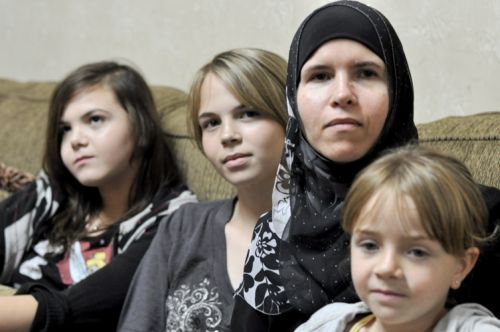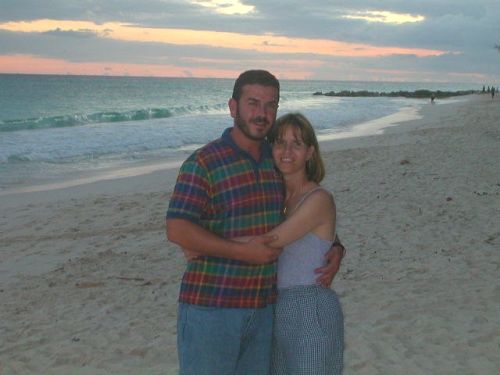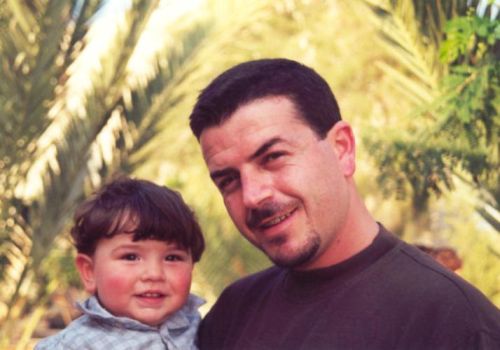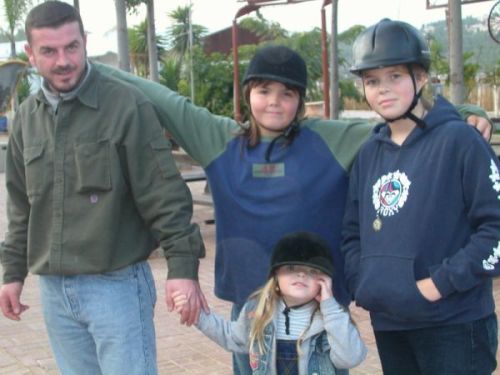A Widow Mourns, An Army Lies
By Kara Newhouse
25 June , 2010
Palestine Monitor
Last week Palestine Monitor reported that Israeli police shot and killed Shu’fat resident 39-year-old Ziad Jilani in the East Jerusalem neighbourhood of Wadi Joz. Now his widow, a U.S. citizen, reflects on her husband’s life and death, and the journey he’s taken her on. Reporting from Kara Newhouse.

Moira Jilani, wife of slain East Jerusalem native, Ziad Jilani, with their daughters, Mirage (15), Hannah (17), and Yasmeen (7)
Moira Jilani remembers her experience vividly, "I felt happy that day. We were going to go out and celebrate, because the children finished exams the day before," she tells me from her brother-in-law’s house, where she’s spent her days since Ziad’s death on June 11. "We were cleaning, getting rid of the winter clothes. We had the music loud, the girls were dancing. We were ready to leave."
"When Aya [her niece] came knocking at the door, she was crying, her whole face was drenched. She said, 'My mom wants you. Come now,’ I said, "Aya, Aya, is it Ziad?" She didn’t say anything. She couldn’t say anything. I knew he was dead."
Moira comes close to tears just once during our three-hour interview. Most of the time she speaks in a steely voice, anger her prevailing emotion over Ziad’s killing and the broader injustice it represents. "A soldier shot a guy today. What else is new? That’s how the whole world looks at it," she said. "Everyday you hear something like that, but this one is not going to go unheard. My husband, he was killed brutally. If you heard someone doing that to a dog, you would be crying. But to hear it done to a human being…" she trails off.
Jilani’s sisters called their brother’s death unnecessary, pointing out that if he had committed a crime, the police should have arrested him and carried an investigation. Instead, officers shot Jilani point blank in the head after he fell to the ground from initial bullet wounds. While Haaretz originally referred to the shooting as the result of a 'suspected terror attack,’ with Jilani reportedly hitting three border police with his truck, Amira Hass’ article from Wednesday cites other possibilities for the incident: In tight traffic with pedestrians returning from Friday prayer, witnesses reported seeing stones thrown at police officers. Some said they saw those stones hit Jilani’s car, causing him to swerve. Thousands of Palestinian men streamed into the Jilani’s Shu’fat neighborhood in the two days following his death. Although Jilani had no political affiliations, he was swiftly labelled "Shaheed (martyr) Ziad Jilani." on posters.
"In English, when people think of martyr, they think, 'he went to war, he became a martyr,’" said Moira. "No. He did not go to war. He died an Islamic death, without guns. He had not even a pencil to defend himself. A pencil is considered a weapon over here."
'Over here’ is a long way from Moira’s home countries: the U.S. and Barbados. She met Ziad in Texas in the early 1990’s, where she managed a Sbarro pizza chain. He was studying at Texas A&M University. "We were inseparable from the day that we met," she said. "My husband was the sort of man people wanted to know him just from his look. His eyes used to tell a story. They used to dance for me."

Ziad and Moira Jilani in Barbados, 2003
Moira was pregnant six months after marrying Ziad, and made her first trip to Palestine for her brother-in-law’s wedding. "I was very hesitant when we came over here, because all I’d ever seen in the news was Palestinians throwing rocks and these things—I was very influenced by the propaganda," she said.
She soon fell in love with her husband’s country, and the couple decided to stay in Shu’fat. "I don’t speak a word of Arabic, but I’ve been blessed with a wonderful family all around me," Moira explained. "My children have so many uncles, so many aunts, so many cousins. They see each other every day, they come and visit. It’s not like the life in America where it’s just friends. I had never experienced the blessing of such a large, loving family before. It was wonderful."
After Ziad’s death, the large extended family and the close quarters in which they live became even more important. Moira noted that the previous night she had found her second daughter, Mirage, crying over photos of her father. The 15-year-old told her mother she was afraid she would forget her dad. Moira replied, "Already? He just died. Don’t worry, nobody here will let you forget your father."
The family smile as they described their trips to Jericho when Ziad took his daughters and their cousins to drive his truck on a deserted road. "We would go there to barbeque with all the family. All the kids would be going just for him to let them drive—even the neighbours," Moira recounted.

Ziad Jilani with his nephew, Mohammed, in Jericho
Moira’s marriage into the Jilani family changed her view of the world even before an Israeli police officer killed her husband. She described her reaction to the prejudiced treatment Ziad received at Ben Gurion airport when they first came to his occupied homeland: "I was shocked. I’ve travelled the world, but I’d never travelled it with a Palestinian. That opened my eyes."
Speaking repeatedly about Israel’s oppression of Palestinians in the West Bank and Gaza in addition to East Jerusalem, Moira vowed not to let her husband’s death be written off. "I will tell everybody that will talk to me that their tax money is paying for those bullets that went through my husband’s head. That they’re paying for the airplanes to come over and bomb Gaza."
Israeli authorities told Moira they are conducting an internal investigation on her husband’s death. They confiscated her husband’s laptop on Tuesday. She has not received medical reports on her husband or information regarding the whereabouts of his vehicle, which may contain evidence to confirm the reports of stones impairing his driving. Moira said she is pursuing legal action on her husband’s death. She declined to discuss details but affirmed that she would not settle out of court. Such struggle will continue to define her life.
"This is my children’s home. They should be able to live in freedom. I love this country so much that I’m willing to stay here and sacrifice the easy life. My husband, hamdi’lillah (thank God),took me on this journey that I love so dearly. I just didn’t think that it was going to end so soon."

Ziad with Moira’s family
Read about Ziad’s death here http://www.palestinemonitor.org/spi...
Also Read
Israelis Keep The Trigger Tight
By Mel Frykberg
Two weeks ago 41-year-old Ziad Julani from East Jerusalem was shot a number of times at close range in the head and abdomen by Israeli special forces as he lay wounded on his stomach on the ground. An ambulance took the critically injured man to hospital but he died shortly afterwards

